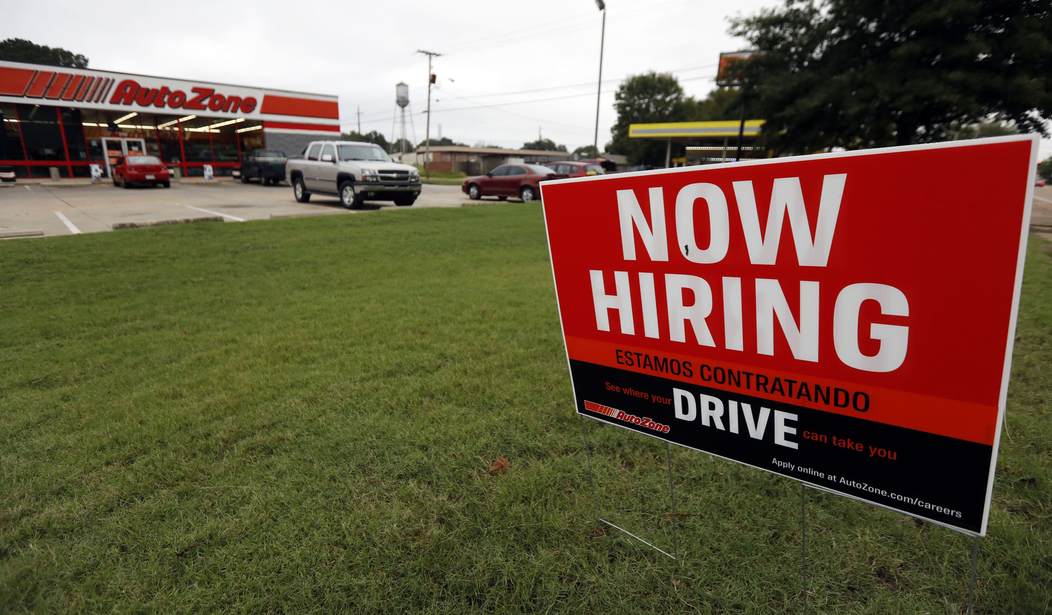The Bureau of Labor Statistics (BLM) stirred the political pot last week when it reported that non-farm payrolls grew as much as a million fewer jobs from April 2023 to March 2024.
That's an awful lot of jobs to just disappear into the ether. Did the bureaucrats at the BLM run out of fingers and toes to count jobs? Or did someone at the independent agency put their thumb on the scale to make Joe Biden look good?
The explanation is far less exciting.
The first inkling of trouble occurred when economists at several large investment houses reported on Tuesday last week that the government’s preliminary yearly benchmark revisions on Wednesday will show "payroll growth in the year through March was at least 600,000 weaker than currently estimated — about 50,000 a month, as Bloomberg reported.
JPMorgan Chase & Co. forecasters saw a decline of less than half a million (a number in line with other yearly revisions over the past few years), Goldman Sachs indicated it could be as large as a million.
When BLS released the yearly estimated revisions on Wednesday, it showed a "loss" of 818,000 jobs compared to what had been reported. This was due to a quirk in reporting, nothing at all nefarious. The BLS tracks job numbers using several sources, and monthly revisions of several thousand more or fewer are necessary. The yearly revisions are rarely as inaccurate as the numbers released last Wednesday. This was the largest downward revision of yearly job numbers since 2009.
Wall Street had been waiting for the revisions numbers, with many economists expecting a sizeable reduction in the originally reported figures. The new numbers, if they hold up when the BLS issues its final revisions in February, imply monthly job gains of 174,000 during the period, as opposed to the initial indication of 242,000.
Even with the revisions, job creation during the period stood at more than 2 million, but the report could be seen as an indication that the labor market is not as strong as the previous BLS reporting had made it out to be. That in turn could provide further impetus for the Federal Reserve to start lowering interest rates.
“The labor market appears weaker than originally reported,” said Jeffrey Roach, chief economist at LPL Financial. “A deteriorating labor market will allow the Fed to highlight both sides of the dual mandate and investors should expect the Fed to prepare markets for a cut at the September meeting.”
The revisions up the possibility that the Fed will cut more than a quarter point from the prime rate. That will be welcome news for auto sales and home buyers.
Once a year, the BLS benchmarks the March payrolls level to a more accurate but less timely data source called the Quarterly Census of Employment and Wages, which is based on state unemployment insurance tax records and covers nearly all US jobs. The release of the latest QCEW report in June already hinted at weaker payroll gains last year.
Apparently, the huge number of illegal aliens who got jobs in the last year contributed to the discrepancy.
To be sure, economists at Goldman Sachs said later Wednesday that they think the BLS may have overstated the revisions by as much as half a million. The firm said undocumented immigrants who now are not in the unemployment system but were listed initially as employed amounted for some of the discrepancy, along with a general tendency for the initial revision to be overstated.
Sen. Roger Marshall (R-Kan.) wants to hold a hearing on the wrong numbers supplied by the BLS. Indeed, the political impact of the 800,000 jobs that Biden and Harris have been touting for months is going to continue as few voters will ever read about the 30% revision downward.
“Using taxpayer dollars to mislead the public for political gain is an outrageous betrayal of trust and one of the reasons Americans have lost all faith in this Administration,” Marshall told The New York Post.
"Mislead" might be too strong a word. They would have to be aware that they were falsely releasing incorrect data. There's no evidence for that, nor is it likely.
As political theater, however, it's first-rate.










Join the conversation as a VIP Member